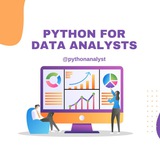tg-me.com/pythonanalyst/970
Last Update:
Preparing for a SQL interview?
Focus on mastering these essential topics:
1. Joins: Get comfortable with inner, left, right, and outer joins.
Knowing when to use what kind of join is important!
2. Window Functions: Understand when to use
ROW_NUMBER, RANK(), DENSE_RANK(), LAG, and LEAD for complex analytical queries.
3. Query Execution Order: Know the sequence from FROM to
ORDER BY. This is crucial for writing efficient, error-free queries.
4. Common Table Expressions (CTEs): Use CTEs to simplify and structure complex queries for better readability.
5. Aggregations & Window Functions: Combine aggregate functions with window functions for in-depth data analysis.
6. Subqueries: Learn how to use subqueries effectively within main SQL statements for complex data manipulations.
7. Handling NULLs: Be adept at managing NULL values to ensure accurate data processing and avoid potential pitfalls.
8. Indexing: Understand how proper indexing can significantly boost query performance.
9. GROUP BY & HAVING: Master grouping data and filtering groups with HAVING to refine your query results.
10. String Manipulation Functions: Get familiar with string functions like CONCAT, SUBSTRING, and REPLACE to handle text data efficiently.
11. Set Operations: Know how to use UNION, INTERSECT, and EXCEPT to combine or compare result sets.
12. Optimizing Queries: Learn techniques to optimize your queries for performance, especially with large datasets.
If we master/ Practice in these topics we can track any SQL interviews..
Like this post if you need more 👍❤️
Hope it helps :)
BY Python for Data Analysts
Warning: Undefined variable $i in /var/www/tg-me/post.php on line 283
Share with your friend now:
tg-me.com/pythonanalyst/970
